120 videos match your search.
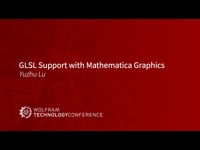 |
Yuzhu Lu Mathematica Graphics has a new experimental support for using existing OpenGL Shading Language (GLSL) files to customize 2D/3D graphics rendering through surface appearance. It has been used to develop ... |
 |
James Lane New Graphics features in Version 13 include MaterialShading, a new Light directive and the canonicalization of AxisObject. Graphics has significant improvements to software rasterization, Dashing, VertexTextureCoordinate specification and the ability to ... |
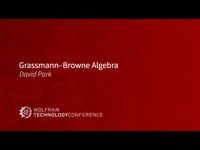 |
David Park The GrassmannCalculus application, based on the work of Grassmann and Browne, is described. One example, the derivation of coordinate equations for lines and planes in n-dimensional space, is presented. This ... |
 |
Keiko Hirayama and Jason Martinez Wolfram Language provides a wealth of computational tools for improving and maintaining health and fitness. Using Wolfram|Alpha Notebook Edition, we show the breadth of information available related to nutrition, ... |
 |
Bernat Espigule This talk discusses New Learning Journeys, created exclusively for the History of Mathematics Project. Virtual exhibits and their navigation were entirely built using Wolfram Language, the Wolfram Knowledgebase and Wolfram ... |
 |
Ed Pegg In a sparse ruler, such as {0, 1, 6, 9, 11, 13}, all the distances can still be measured even though many marks are missing. The speaker has proven, by construction, that sparse rulers of any ... |
 |
Piero Sanchez This talk discusses the integration of Wolfram Language with multiple blockchains and expanded capabilities for users to create their own connections to other blockchains. By integrating decentralized technologies with Wolfram ... |
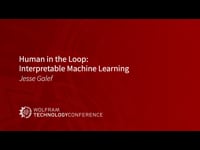 |
Jesse Galef This talk highlights both existing and upcoming tools in Wolfram Language that can be used to gain insight into machine learning models. |
 |
Davit Baghdasaryan and Markus van Almsick This talk shows how the improved registration capabilities added to Wolfram Language with Version 12.3 are used to provide powerful image stitching capabilities, including demonstrations of large scans, panoramas, and virtual ... |
 |
Sean Cheren This talk gives details and examples of new and updated formats coming in the next version of Wolfram Language: specifically brand-new exporters for statistics-related formats and updates to metadata in ... |
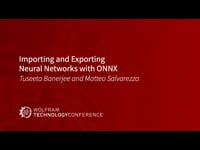 |
Tuseeta Banerjee and Matteo Salvarezza In this talk, we review the current state of the ONNX importer and exporter in Wolfram Language and show how to use their options and properties. With the help of ... |
 |
Stephen Wolfram |
 |
Jeremy Stratton-Smith and Anne Marie Torresen The latest version of Wolfram|Alpha Notebook Edition includes a set of interactive self-driven quiz functions, the first set of which revolves around function plotting for high school/early college ... |
 |
Anshu Manik Wolfram Technical Consulting works with users to leverage Wolfram technologies to automate processes, design and train new machine learning/AI models, develop custom applications, implement innovative algorithms, run deep data ... |
 |
Jose Martin-Garcia, Jeff Bryant and Truman Tapia |
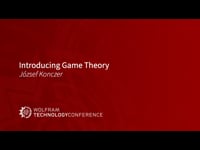 |
József Konczer This talk introduces the basic concepts of game theory framework and how they have been implemented in Wolfram Language. The presentation includes proposed construction, visualization and solution methods for various ... |
 |
Conrad Wolfram, Alec Titterton, Abrita Chakravarty and Jamie Peterson In this talk, Conrad Wolfram describes the initiative for offering proficiency certifications for many different facets of computation, why Wolfram decided to embark on it and how everyone in the ... |
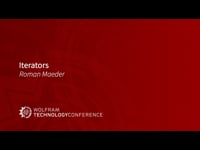 |
Roman Maeder Iterators are a generalization of lists that are accessed one element at a time. Iterators allow us to work with data whose length is infinite or unknown, and they avoid the explicit generation of all elements at the same time by using incremental generators. We show an implementation of iterators that allows us to use them like lists, with natural Wolfram Language syntax. Along ... |
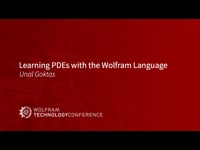 |
Unal Goktas This talk presents an overview of solution methods for partial differential equations (PDEs) in Wolfram Language and how these tools can be used to understand and learn PDEs. This includes ... |
 |
George Woodrow III The Wolfram Language has a number of useful controls, but has no circular slider. In this presentation, I show how I developed one, going from an example in the documentation ... |